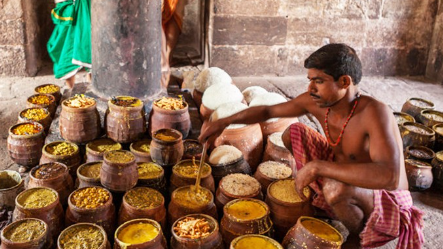

Bhubaneswar: In an age where commercial kitchens rely on industrial equipment and modern technology, the sacred kitchen of Jagannath Temple in Puri operates as the world's second-largest kitchen, feeding up to 100,000 devotees daily using methods unchanged for over 800 years.
This remarkable culinary operation, nestled within the 12th-century temple complex, represents one of humanity's most enduring examples of large-scale food preparation using traditional techniques that predate modern cooking by centuries.
The Numbers That Astound
Every day, the temple kitchen prepares food for 1 lakh people, with all items being only boiled using traditional methods. The scale becomes even more impressive during festivals, when daily food preparation reaches 10,000 kg during special occasions like Kartika.
About 1,000 cooks prepare 56 different kinds of offerings — called Chhappan Bhog — to serve to the Gods, six times a day. This intricate operation runs with clockwork precision, with 600 cooks working daily, including 200 Suar who actually cook the preparations on fires, and 200 Joganya who help by lighting fires and washing utensils.
Ancient Technology, Modern Results
The kitchen's most fascinating aspect lies in its complete reliance on traditional methods. Mahaprasad is cooked only in earthen pots using traditional wood as the medium for fire, with all food being steam-cooked. No gas, electricity, or modern cooking equipment finds place in this sacred space.
The cooking process follows an ancient technique where earthen pots are stacked one above another on wood fires. This method, which appears primitive to modern eyes, actually demonstrates sophisticated understanding of heat distribution and pressure cooking principles that scientists are only now beginning to fully appreciate.
The Sacred Logistics
The kitchen uses 30 to 70 quintals of rice daily, along with massive quantities of vegetables, lentils, and other ingredients. The procurement, storage, and distribution of these ingredients represents a logistical marvel that operates without modern inventory management systems.
The temple's food distribution system, known as Ananda Bazar, ensures that over 56 varieties of food prepared as Mahaprasad are available to devotees daily, with the best time to buy being after main offerings in late morning and early afternoon.
The Spiritual Dimension
Mahaprasad is treated as 'Anna Brahma' (God in the form of food), with steam-cooked food being offered first to Lord Jagannath and then to Goddess Bimala. This spiritual framework transforms what could be mere food preparation into a sacred ritual performed with devotion and precision.
Tradition holds that all Mahaprasad cooked in the temple kitchen is supervised by Goddess Lakshmi, the empress of the temple herself, adding a divine dimension to the entire culinary operation.
Environmental Sustainability
Long before sustainability became a global concern, Jagannath Temple's kitchen embodied eco-friendly practices. The exclusive use of wood fires, earthen pots, and natural ingredients creates zero industrial waste. The earthen pots, made by local potters, support traditional crafts while ensuring food purity.
The kitchen's waste management system, developed over centuries, ensures that food never goes to waste. Leftover prasad is distributed through an intricate network that reaches every corner of the temple complex and beyond.
Challenges and Continuity
Operating such a massive kitchen using traditional methods presents daily challenges. Coordinating 1,000 cooks, managing wood fires, and ensuring consistent quality across 56 food varieties requires skills passed down through generations. The temple's cooking families, many of whom have served for centuries, maintain this knowledge through oral traditions.
Weather conditions, festival crowds, and ingredient availability constantly test the kitchen's adaptability. Yet, this ancient system continues to function with remarkable efficiency, rarely facing the supply chain disruptions that plague modern food operations.
Modern Relevance
In an era of processed foods and industrial cooking, Jagannath Temple's kitchen offers profound insights into sustainable food systems. The emphasis on simple, boiled foods using natural ingredients provides a template for healthy eating that modern nutrition science increasingly validates.
The kitchen's ability to feed massive crowds using renewable energy sources and biodegradable cookware presents a model for sustainable mass food preparation that could inform modern approaches to community feeding programs.
Beyond the Kitchen
The temple kitchen represents more than culinary expertise; it embodies a philosophy where food preparation becomes spiritual practice. The integration of devotion, tradition, and practical efficiency creates a unique model of human organization that has sustained itself for eight centuries.
As the world grapples with sustainable food systems and authentic cultural practices, Jagannath Temple's kitchen stands as a testament to human ingenuity and spiritual dedication. It proves that some of humanity's greatest achievements lie not in technological advancement but in the perfection of time-tested methods guided by unwavering faith.
This sacred kitchen continues to feed not just bodies but souls, maintaining an unbroken chain of tradition that connects modern devotees with eight centuries of continuous spiritual and culinary practice. In a rapidly changing world, it remains a beacon of consistency, sustainability, and divine service.